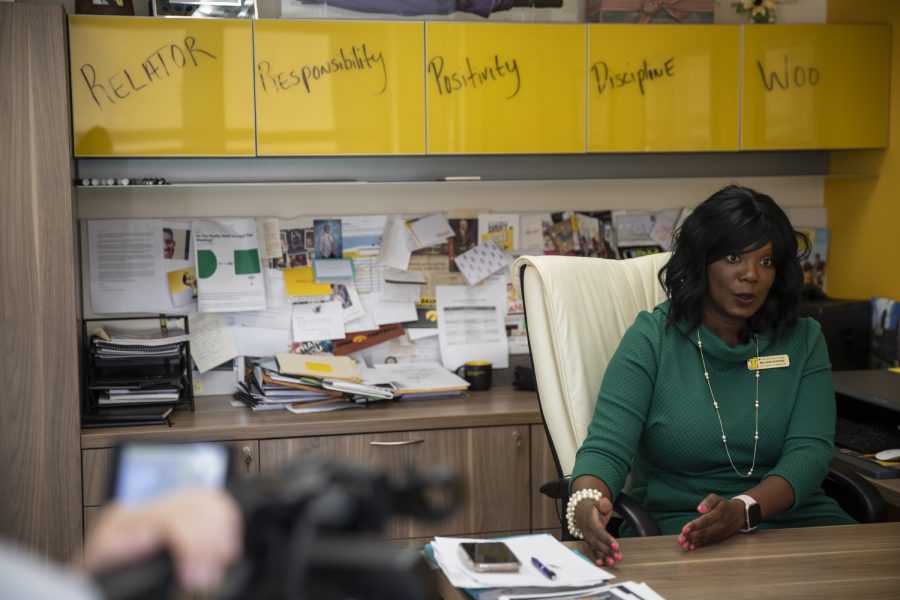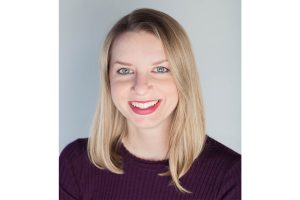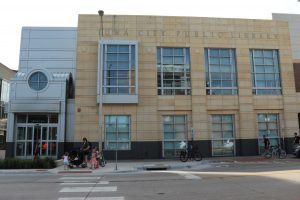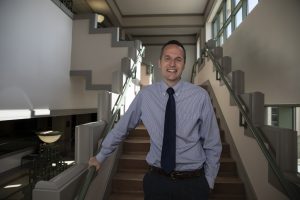Q&A: VP of Student Life Melissa Shivers talks DEI action plan, student disability services, and #DoesUiowaLoveMe
In an interview with The Daily Iowan on Tuesday, University of Iowa Vice President of Student Life Melissa Shivers talked about the Diversity, Equity, and Inclusion action plan, recent efforts by Student Disability Services, and more.
Vice President of Student Life Melissa Shivers sits down for an interview with The Daily Iowan on Tuesday, Oct. 8, 2019.
October 9, 2019
The Daily Iowan: With the recent allegations against a woman in Kappa Kappa Gamma for racist language, how is the Office of Student Life addressing this issue in the sorority and in the larger issue of acceptance in FSL?
Shivers: As you all know, we are working on our FSL strategic plan, and a big part of the conversation that the group had relating to fraternity and sorority life was around diversity, equity, and inclusion. I think, certainly earlier this week, we were disappointed in the engagement or the comment that was made on the social media post, and I feel strongly that they FSL community has been very vocal in terms of their concerns and displeasure with that as well. From a division of student life perspective, as you all know, there was a report submitted to the office of student accountability, and that’s really all that we can say in terms of a disciplinary process as it relates to a student, if there is a disciplinary process.
DI: Is the Office of Student Life taking steps to make things more inclusive in FSL?
Shivers: Sure, I absolutely think so. I know that in the communication that was sent from Panhellenic president, she talked about the plans going forward for being able to identify having conversations or even training, I think, relative to the community and understanding the challenges when we communicate in ways that may not be for some people, and certainly the ways they are wanting to address the situation may be difficult for others to understand or appreciate, and certainly in this case the community has to see that language as racist, and that’s not a part of who we are at the University of Iowa and certainly not a part of the FSL community.
So, I certainly look forward to working with them as they would need for me to. Dean [Reams] and Dean Nelson do a fantastic job in co-supervising and leading the FSL community. However, we have high expectations of what engagement on our campus looks like and certainly will do our best to try and make sure that we are instilling the best practices and certainly providing the appropriate training, knowledge, and skills for our community to feel more comfortable in being able to address issues like the ones that we saw this past weekend.
DI: Where is the FSL action plan at? I know we’ve spoken about that a lot.
Shivers: I think the last time we spoke — I think I had shared with you all that the FSL or Dr. Nelson, I think, may have shared with you all that there was a plan to have a sort of open forum and have opportunities for people to be able to weigh in. Yesterday he told me that they just wrapped up those on yesterday. And so, they’ll take that data and use that data to then inform any changes with the action plan. So, I think their hope is to try to have something to me by the end of the month once they’ve been able to talk to all the groups that they needed to speak with.
DI: Part of the action plan was talking about making it a more inclusive community, so is there anything that this incident this past weekend has highlighted more of a need for?
Shivers: I think understanding, quite frankly, how when we make comments that are perceived and quite frankly are hurtful, that there are implications for a larger community. One of the things that I think is of concern to the community is how the actions of one can impact the entire community and the message that it sends. And so how do we make sure that people think more critically about some of the comments and how we utilize social media and certainly, again, that alignment with both the university values, but also the values of their fraternities and sororities. And I think if you look at any of them, that none of them would find the comment that was made acceptable, or in alignment with who they are.
And so how do we start to get the groups back thinking of and reminding them of their values and who they want to be? And I think that a part of this action plan and what happened this weekend allows for us to have a more focused conversation with the group about the implications of and the pain and disappointment that comes when we make comments that we certainly have the right to make, but there are implications when you do something like that, and the pain and challenge that it creates for not just you but also for the community.
DI: I know the first pledge class for this year just finished up their rush yesterday around this time, bid day was yesterday, so with the FSL action plan, how do you think that’s going to help this pledge class sense they are just now starting out in the community?
Shivers: I think the timing is going to be fantastic, because they will come in knowing that there is a plan, and this is how the work that they do and how they represent themselves both in our campus community and nationally will be guided and will get some direction from the plan, so this group will come in knowing that there is a plan, knowing what the goals and strategies are and will hopefully be on the roadmap to being able to figure out how best to support that plan.
DI: Since this FSL strategic plan has been being worked on for the last year or so and new leaders have stepped in during that time, how have the new Greek leaders been able to maintain momentum on improving them?
Shivers: The great thing is that we’ve had many members, many have graduated, but a lot of them were here from the very beginning when we started the strategic planning process and are very much connected to the strategic plan. They were participants in the creation of the plan and are certainly trying to make sure that what we put forward in the plan are things that can actually be operationalized. The expectation will be that they will share that plan, and we will share the larger plan with the entire community, and then that those communities will go back and be able to talk more strategically about what they could do within their chapters to support that plan. I have been incredibly impressed, quite frankly, with the council presidents and their leadership. I’ve spent a lot of time, most recently, with both Panhellenic and IFC over the past spring, and believe a lot in where they know the organization needs to go and the leaders who are working with them in their chapters and a part of their particular councils are also really clear about what the expectations are, and I believe are working collaboratively in a lot of ways to ensure that the community can be stronger. This, this weekend, was certainly a challenge and certainly not something that anyone expected and certainly not something that we support or subscribe to in any shape way or form. Yet, I also believe that these are opportunities for learning and for us to be able to stand up as a fraternity and sorority community to emphasize and to demonstrate what our values are.
RELATED: Q&A: New Provost Montserrat Fuentes speaks on starting at the UI
DI: With the DEI action plan moving forward, there’s been a lot of talk from Provost Fuentes and others about changes in the departments and in the colleges to move forward with that plan. How do you think that those things are going to trickle down to students?
Shivers: I am really excited about the work that has started from April 4 of this year to present day. I have been encouraged by the campus community’s continued commitment to the implementation of that plan. As a part of that plan, the division of student life had a big role in and responsibility, quite frankly, in the student experience.
Some of the things that we’ve already done that will directly impact students is that we hired Dr. Maria Bruno who was over in University Counseling Services who is now serving as our executive director for belonging and inclusion. I’m sure that you all remember the important conversation that took place on our campus in the spring, the #DoesUIowaLoveMe movement, and through that, if you’ve had an opportunity to read the quotes and the comments that were shared by members of our campus community, there was an overall sense of perhaps, ‘Do we belong here? Is this a place that is welcoming and inclusive to me and all of the identities that I hold?’ And, it felt to me that we needed to make sure that we continued to support our student community in hiring an executive director for belonging and inclusion who, that is their primary job, is to work with our entire campus community to make sure that we are abreast and aware of issues and concerns that exist, much like the ones that were shared through the #DoesUIowaLoveMe, to have someone who everyday they’re thinking of ways to make sure that our students have a venue for sharing issues and concerns, but also helping to make sure that we are partnering across campus with other students, faculty, and staff to create that type of community that increases that sense of belonging.
So, we are really excited to have Dr. Bruno on board. Yesterday was her very first day, and she had lots to read and lots of people to meet with, but boy are we are lucky that she decided to stay with us at the University of Iowa. I am incredibly fortunate that she will be an outstanding team member in continuing to support the divisions work around Diversity, Equity, and Inclusion.
I think it’s also really important to note that as we continue to focus on the recruitment of our students to campus, there’s a strong focus on retention as well. And so, what both President Harreld and Provost Fuentes spoke very candidly and eloquently about is that it is important for us to retain all students. I would love a 100 percent retention rate for all of our students. I would love a 100 percent graduation rate for all of our students, but what we know is what happens in between from the moment they choose us until it’s time for them to walk across that stage, is an experience that we are helping to create for them.
The work of Dr. Bruno, some of the conversations that I am now holding, I’m not sure if you all have heard of them, but I am calling them campus conversations or courageous conversations with the VP. I’ve now had three of those, and they have been incredibly insightful for me in terms of students and their interests and wanting to know more about what the university is doing in a myriad of areas of our campus. But also, their willingness to be very candid about some of the areas of challenge that they are experiencing. It allows me to be able to go back to the president’s cabinet and talk a little bit about what I’m hearing and then what we can do as a university to try and either celebrate some of the things we are doing really well, but also start to focus in on things that we could pay a lot more attention to. I’ll give you an example. Last night, I visited with the students who put forward UISDAA, the student disabilities advocates, and one of the things that we continue to talk about is the relocation of student disabilities services. We had a really good conversation, and I think what you will all hear over the next few weeks is our plan to engage in a much larger campus conversation about the relocation of student disabilities services. Where should that be? How timely do we need that to be? How do we make sure that whatever we do, we’re creating a space that meets all of the expectations of the communities and the various identities related to disability because they’re different and we want to make sure that we are being thoughtful?
So, over the next few weeks, I am meeting with them once a week to talk specifically about how do we garner more feedback from our campus community with the hopes of being able to host a town hall closer to the end of November to get feedback from a large campus community about what should the location of SDS be. We want to take that approach because what we know is that we are getting ready to make a decision that will be a 50- to 75-year decision, and a lot of the students who are currently here will graduate and may not see this facility or this relocation come to be. But, what we want to do is make sure that we are memorializing for the campus that we had a campus discussion about this topic, that we had decided that this is something that we really need to pay a lot of attention to, to find a location, a suitable location, for our student disabilities services and one that the community continues to be aware of, who started to lead this conversation, and then how do we demonstrate that it was a campus conversation and that lots of feedback was taken into consideration and then we start to move on whatever that decision that may be.
I’m excited about that process because I think we’ve had some incredible advocates from UISDAA, they’ve been amazing to me. Yet, we also know that a large number of students who have disabilities have not had an opportunity to participate in this conversation and we want to make sure that it’s an inclusive one. So those are just some of the things that we are continuing to do that I know our students will continue to see us moving in a really good direction.
We had a meeting a couple of weeks ago about the cultural and resource centers as well, and an idea of how do we better establish those cultural resource centers on our campus. A few years ago, we were able to really place resources into making sure that those facilities were in better condition, and certainly we want to continue to invest in them. How do we make sure that we are supporting the cultural resource centers and the communities that they serve and sending a message that anyone is welcome in those spaces, and that it’s a place for affirmation and for support for students on campus and a place that can be seen as that home away from home either the home away from the residence hall home or the home where students are coming to us from at the University of Iowa. So, I think that we are continuing to do a lot of good work that’s operationalizing the DEI action plan and look forward to the continued progress on those projects and conversations because they’re critically important to us.
DI: The location of the SDS office, of course that can’t really just be up and moved, but is there anything that you’ve been able to do for that population more immediately?
Shivers: That was exactly the conversation that we had last night. I’m really interested in, do we want a short term relocation or do we actually prefer to wait for an ideal location and move once or move twice? And so, that’s going to be the conversation that we have. The students have said we want to make sure it’s the right move and that we’re not settling. So, if you rush something, are we going to be rushing it and it not be exactly what we need or want or is there benefit to actually waiting a little bit longer. You can’t just sort of up and move it, and that’s it. You want to make sure it moves into a location that is accessible, but also one that can help to meet the needs of the community.
You all may or may not know but SDS just participated in a program review where we had three external reviewers to come to the University of Iowa. I think those dates were Sept. 22-24. And so, within 30 days, that group has to submit to us a report. What we don’t know, is if they are going to make recommendations, quite frankly, on expanding the scope of SDS. So right now, SDS is 100 percent focused on students for academic accommodations. What we might hear from the program review team is that scope needs to be broadened. If the scope needs to be broadened, what does that mean in terms of the space? So, if they tell us that they think we need to focus more on a particular area, and we currently don’t have a staff member whose focusing on that area, what we’re going to need to do is plan for a larger space to be able to accommodate any growth that may come from that program review report. So, we don’t want to get so far ahead of the program review that we make decisions about the location based on present day, because what that report will tell us is what else may be needed that the University needs to be focused on that we’re currently not. So, these things are kind of happening simultaneously. Our goal is to have the town hall, as I said, before the end of the fall term, so that means that we’ll have the report back, so as we go into this town hall conversation, we have more data about what SDS will be focusing on and what the scope of their work will be, and that can then help to inform what a space might look like and the timeliness of that space.
DI: Going back to those campus conversations that you’ve been having with students, what are some other issues that you’ve been hearing a lot of students talk about with you?
Shivers: So, it’s varied. They have a lot of conversations about the first amendment, in terms of free speech, and what does that mean and how do we reconcile that. A lot of them are really curious about my career path and how to work in student affairs, and I didn’t expect [that], I was like, oh I can talk about this all day, to sort of what things do I do for my own self-care to what things can they do as student leaders to be better engaged on campus, what they can do to better support the University, and, quite frankly, what I wanted to hear from them are what some things that we can do to better support you.
So, I spent time at the LNACC. I’ve also met with the international student advisory board and last night was UISDAA. Tomorrow night I’m with the pride house, and then next week I’m with the Afro-house and the Asian Pacific American. So, I will have rounded out. I also have a — we’re trying to schedule with AJ Rose with IFC to also be able to talk to them, as well as wanting to be able to reach into our resident assistant on campus to talk a little bit more about sort of what they need and what kind of things are working well for them within the residence halls since they work with so many of our first year students.
So, I imagine the topics will vary because I don’t come in with an agenda. They literally guide the conversation, and I answer any questions that they ask me. The great thing about those I think has been that students have felt really comfortable being very transparent and asking questions that are of interest to them. My very first one was on the heels of wanting to understand all of the things that they were hearing in the news about the band, and so they wanted to get some more clarity about that and I was like, ‘Oh you should just read the *DI*. They did a really nice job.’ I’m kind of kidding, but not really, to talk about that. So, the topics vary. Some of them are Diversity, Equity, and Inclusion related, but a lot of them are just genuine things that people want to know more about. Our international student advisory board wondered about recruitment for more international students on campus, ways that my office could better support international students. That was about an hour like meeting on a Friday evening. I was like, ‘Y’all want to meet on a Friday night, this is amazing to me,’ and they were all there. So, the topics vary from group to group which is exciting for me because I never know what we’re going to [talk about]. It’s kind of like this, I’m not always quite sure of where we are going.
Editor’s Note: In a previous version of this article, the spelling of Dr. Maria Bruno’s name was incorrect, as well as the acronym LNACC. These have been fixed, and the Daily Iowan regrets these errors.






